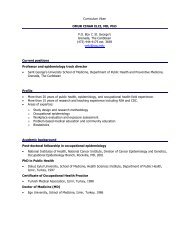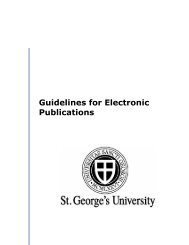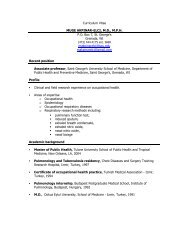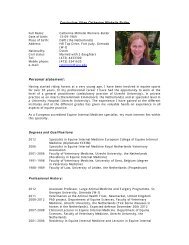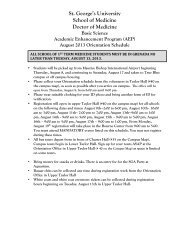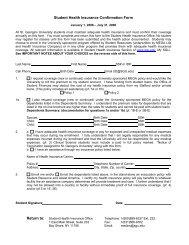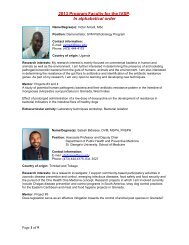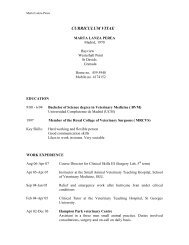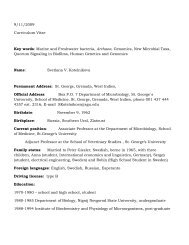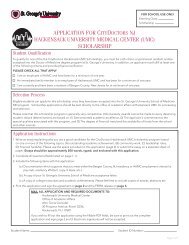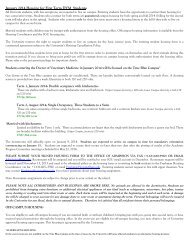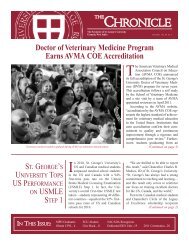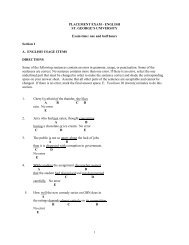SCHOOL OF 2012-2013 - St. George's University
SCHOOL OF 2012-2013 - St. George's University
SCHOOL OF 2012-2013 - St. George's University
You also want an ePaper? Increase the reach of your titles
YUMPU automatically turns print PDFs into web optimized ePapers that Google loves.
MICR 817<br />
Tropical Medical Parasitology II<br />
This course is designed to provide participants with<br />
laboratory, field, and clinical experience dealing with<br />
Wuchereria Bancrofti, Plasmodium Falciparum, Plasmodium<br />
Vivax, Leishmania, and Echinococcus Granulosus, all of<br />
which are common parasitic diseases that are the cause<br />
of considerable mortality and morbidity throughout the<br />
tropics. Complementing Tropical Medical Parasitology<br />
I (MICR 816), this course looks in greater detail at the<br />
epidemiology and public health importance of two or<br />
three major tropical medical parasites. This course is<br />
accompanied by a visit to a region where these parasitic<br />
diseases are endemic.<br />
MICR 818<br />
History of Microbiology<br />
History of Microbiology studies the origins and<br />
development of the science of microbiology using a<br />
historical approach from the Renaissance to the postantibiotic<br />
era. The course will involve lectures, discussions,<br />
guided readings, and the preparation of a term paper.<br />
Prerequisite: General Microbiology (BIOL 401) or Biology (BIOL 301)<br />
MICR 819<br />
Medicinal Plants<br />
This course examines the influence of medicinal plants<br />
(herbal remedies) in 20th century medicine. The advantages<br />
and disadvantages of medicinal plant usage are examined,<br />
as is the evaluation of the use of certain medicinal plants.<br />
MICR 820<br />
Marine Microbiology<br />
Marine Microbiology studies microorganisms found in<br />
oceanic littoral, pelagic, and benthic environments. This<br />
course covers microbial ecology, including microbial loops,<br />
evolutionary trees, sediment, deep seas, and the sunindependent<br />
ecosystem.<br />
MICR 822<br />
Medical Biofilms<br />
This course will discuss the relevance of the biofilm mode<br />
of growth with regard to infectious diseases and disease<br />
processes (enhanced microbial survival, evasion of immune<br />
response components, and so forth), focus on infections of<br />
indwelling medical devices (heart valves, catheters, artificial<br />
joints), and examine the relevance of biofilm formation with<br />
regard to treatment strategies and failures.<br />
MICR 823<br />
Microbial Effects on Climate and Geosphere<br />
This course covers geomicrobiology, the role of<br />
microorganisms in geochemical reactions, oil and gas<br />
origins, the production of methane and carbon dioxide,<br />
and how life in deep subsurface is similar to life on Mars.<br />
MICR 824<br />
Advanced Biochemical Methods in Microbiology<br />
This course examines strict anaerobe maintenance,<br />
DNA extraction, DNA-DNA reassociation, sequencing,<br />
electrophoresis of proteins, indirect immunofluorescence,<br />
chemical analysis of cell walls, G+C content in DNA, gas<br />
chromatography, radioisotope techniques, microbial<br />
physiology, light-scanning electron microscopy, PCR<br />
primer design, detection of specific microorganisms, gene<br />
cloning, plotting and reference programs, and 16S rRNA<br />
database interaction.<br />
MICR 825<br />
Scientific Text: Organization and Presentation (STOP)<br />
The effective organization and presentation of scientific<br />
information is a necessary skill for students in the master’s<br />
and PhD degree programs to acquire. Scientific texts tend<br />
to follow very specific rules in terms of style, grammar,<br />
and format, regardless of whether a graduate thesis or<br />
journal article is being produced. This course aims to<br />
provide students with an introduction to some of the<br />
stylistic rules and technical aspects of presenting scientific<br />
data. Specifically, this course will target graduate-level<br />
theses, scientific articles, poster presentations, and oral<br />
presentations. As this is a course aiming to teach practical<br />
writing skills, a large component of the class is the<br />
production of a formal research proposal by students.<br />
MICR 828<br />
General Immunology<br />
This two-credit course has been designed to provide<br />
students with an understanding of the major principles<br />
and mechanisms underlying the various aspects of the<br />
immune system, including tissues, cells, and soluble<br />
molecules. There is an emphasis on the interaction<br />
between innate and acquired immunity in response<br />
to inflammation and infection by different groups of<br />
pathogens. Clinically relevant topics are also emphasized.<br />
In addition to classroom instruction, students must<br />
do extensive literature research on a particular topic<br />
and submit a 20-page essay on this topic. Classroom<br />
School of Medicine<br />
Course Descriptions<br />
School of Medicine Catalog <strong>2013</strong>–2014 | 81



